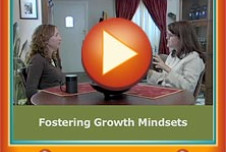The hallways of high school often feel like battlegrounds—with potential social stressors lurking around every corner. When teens get ditched by their best friends or teased for their looks, the sharp pain of exclusion feels like it will last forever. But what if we could help teens take a different perspective?

In a recent study, psychologists at the University of Texas at Austin and the University of Rochester set out to see if a small shift in mindset could reduce teenagers’ social stress. And they found that with a simple, half-hour training, they could help teens cope better, keep their bodies calmer, and even do better in school.
They recruited 60 high school students for an initial experiment, half of whom learned to cultivate a “growth mindset.” Students were taught that getting excluded doesn’t mean they have an inherent personal deficit—no one is doomed to shame and exclusion—nor are those who do the excluding inherently bad people. Instead, everyone is complicated and capable of change. (A growth mindset contrasts with a fixed mindset, where you believe people are born with certain traits, such as intelligence or popularity, and they can’t be improved.) This group of students also read scientific evidence and testimonies from older peers that supported a growth mindset.
The other half of the students (the control group) also learned a growth mindset, but applied to the physical environment in high school, not the social one. They were assured that they would adjust to the new lockers, unfamiliar hallways, and pungent smells, and they also read positive testimonies from older students. Afterward, both groups wrote their own encouraging messages, ostensibly for other students to read (but actually just a way to help them internalize the lesson).
Next, students had to perform a “social stress task,” designed to send their stress levels through the roof. They gave a speech about what makes teens popular in front of some peers—young lab employees trained to frown, sigh, and otherwise look unimpressed—and then completed a grueling math test. The students evaluated how threatened they felt by the tasks, and the researchers also measured their cortisol levels and cardiovascular activity before and after.
As predicted, students who learned a growth mindset for social situations were less likely to perceive the stressful task as threatening. They also showed healthier physiological responses and performed better on the speech and the math tasks. A subtle shift in mindset seemed to be making a difference.
In a second, follow-up study, the same training was given to whole classrooms of 9th graders, and students were also required to keep daily diaries of actual social stressors. After about a week, the control group was faring worse: The more intense the stressful social situations they reported on a given day, the more they felt threatened and unable to cope, and the higher their levels of stress hormones. But for students who learned a growth mindset for their social life, this link disappeared; social stress didn’t seem to be affecting them in the same way. At a seven-month follow-up, they even had better grades than the control group.
So what does this mean for teenagers and the adults who raise and educate them? First, it’s important to be aware that when teenagers view themselves and others as incapable of change, they may experience more emotional stress from the ups and downs of daily adolescent life. This stress can not only lead to negative feelings but also stressed-out bodies and poor school performance.
The good news is that it may be surprisingly easy to convince teenagers to think more flexibly—in this case, with just a 25-minute activity. And it’s likely that ongoing learning and discussion about the growth mindset could have an even greater impact.
As parents and educators, here are some things we can do starting today to promote a healthy social mindset:
- Teach teenagers to see stressful social situations as challenges to be met and overcome, rather than impossible problems that will last forever.
- One way to do that, according to growth mindset pioneer Carol Dweck, is to try reminding teens to add the word “yet” to the end of sentences whenever they find themselves lamenting a stressful social situation (“I don’t have any friends at camp…yet”).
- Look for and acknowledge examples of people and situations changing when it seemed they never would—direct evidence for the growth mindset.
- Keep in mind that social stress may have a negative impact on academic performance. If your teen sits in class worrying all day, they may want to try some mindfulness exercises.
Wherever you start, helping the teenagers in your life see the bigger, more dynamic picture is well worth the time and effort. As the saying goes, even when it comes to adolescence, this too shall pass.



Comments